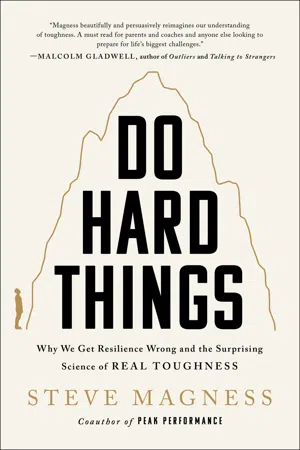
Do Hard Things
The New Science of Inner Strength and How to Develop It for Extraordinary Success
Steve Magness
- 272 pages
- English
- ePUB (mobile friendly)
- Available on iOS & Android
Do Hard Things
The New Science of Inner Strength and How to Develop It for Extraordinary Success
Steve Magness
About This Book
National Bestseller
"In Do Hard Things, Steve Magness beautifully and persuasively reimagines our understanding of toughness. This is a must-read for parents and coaches and anyone else looking to prepare for life's biggest challenges."-- Malcolm Gladwell, author of Outliers and Talking to Strangers and host of the Revisionist History podcast
From beloved performance expert, executive coach, and coauthor of Peak Performance Steve Magness comes a radical rethinking of how we perceive toughness and what it means to achieve our high ambitions in the face of hard things.
Toughness has long been held as the key to overcoming a challenge and achieving greatness, whether it is on the sports field, at a boardroom, or at the dining room table. Yet, the prevailing model has promoted a mentality based on fear, false bravado, and hiding any sign of weakness. In other words, the old model of toughness has failed us.
Steve Magness, a performance scientist who coaches Olympic athletes, rebuilds our broken model of resilience with one grounded in the latest science and psychology. In Do Hard Things, Magness teaches us how we can work with our body – how experiencing discomfort, leaning in, paying attention, and creating space to take thoughtful action can be the true indications of cultivating inner strength. He offers four core pillars to cultivate such resilience:
- Pillar 1- Ditch the Façade, Embrace Reality
- Pillar 2- Listen to Your Body
- Pillar 3- Respond, Instead of React
- Pillar 4- Transcend Discomfort
Smart and wise all at once, Magness flips the script on what it means to be resilient. Drawing from mindfulness, military case studies, sports psychology, neuroscience, psychology, and philosophy, he provides a roadmap for navigating life's challenges and achieving high performance that makes us happier, more successful, and, ultimately, better people.
Frequently asked questions
Information
Index
Table of contents
- Cover
- Title Page
- Dedication
- Contents
- Introduction: How We Got Toughness Wrong and Where to Go
- The First Pillar of Toughness: Ditch the Facade, Embrace Reality
- The Second Pillar of Toughness: Listen to Your Body
- The Third Pillar of Toughness: Respond Instead of React
- The Fourth Pillar of Toughness: Transcend Discomfort
- Acknowledgments
- Notes
- Index
- About the Author
- Advance Praise for Do Hard Things
- Also by Steve Magness
- Copyright
- About the Publisher